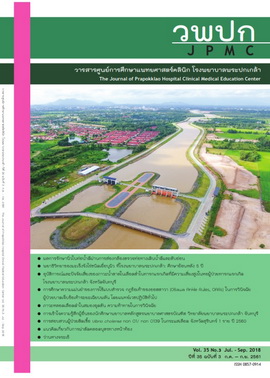การเข้าใจความรู้สึกผู้อื่นของนักศึกษาพยาบาลหลักสูตรพยาบาลศาสตรบัณฑิต วิทยาลัยพยาบาลพระปกเกล้า จันทบุรี
Main Article Content
Abstract
Abstract
Background: Empathy is a predominant quality for nurses because it make better understanding about suffering and better respond to patient’ needs. The empathetic ability in nursing students would be great knowledge that can be beneficial for developing the instructional designs.
Objectives: To compare the empathetic abilities of nursing students at different educational levels and grade point averages
Materials and methods: The study was survey research. Samples were recruited by purposive sampling. There were 373 nursing students at all educational levels participated in this study. The empathetic ability which developed from Jefferson scale of physician empathy-student version in Thai with reliability Cronbach’s alpha coefficient of 0.82, was used for data collection. Data were analyzed using percentages, means, standard deviation, ANOVA, and Kruskal Wallis test.
Results: The findings show that
1) There were statistically significant differences in means scores of empathetic ability among educational levels (F3, 369 =13.446, p < 0.01)
2) There were statistically significant differences in means scores of empathetic ability among grade point averages (p < 0.05)
Conclusions: The findings demonstrated that the empathetic ability is difference among educational levels and grade point averages. Administrators and nursing educational personnel could apply this knowledge to develop a better instructional design in nursing education in order to promote the empathetic ability among nursing students in the future.
Keywords: empathy; nursing students; educational levels; grade point averages
Article Details
References
2. Richardson, K ., MacLeod, R., & Kent, B. (2012). A Steinian approach to an empathic understanding Of Hope among patients and clinicians in the culture of palliative care.Journal of Advanced Nursing, 68, 686-694.
3. Roger CR. Client-Centered Therapy: Its Current Practice, Implications, and Theory. Mifflin, Houghton: MI; 1951.
4. Karn Jumroonrojana and Sombat Zartrungpak. Development of the Jefferson Scale of Physician Empathy – Student Version (Thai Version). Journal of the Psychiatric Association of Thailand 2012; 57: 213-224.
5. Kamolnicha Anan. The Development of Empathy in nursing students using the Contemplative Education. Phrapokklao College of Nursing, Chanthaburi.2017.
6. Coatrakul, Surang. (2541). Educational Psychology. 9 rd edition. Bangkok: Chulalongkorn University Printing.
7. Umporn Rojanasakul. Karn Jumroonrojana. Rattana Saipanish. Study of Changes in Medical Students Empathy to Patients Before and After the First Clinical Year in Ramathibodi Hospital. Journal of the Psychiatric Association of Thailand 2014; 59: 63-72.
8. Sherry R. Lovan. Comparing Empathy Levels in Students at the Beginning and End of a Nursing Program. International. Journal for Human Caring. 2012;16:28-33.
9. Trankasombat,Umaporn. Create EQ for your children. 6 rd edition. Bangkok: Sunta Printing; 2016.

